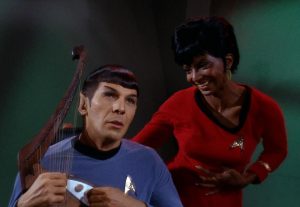The Spock of my childhood embraced his human side in small ways over the course of many years. Some episodes would end with Dr. McCoy commenting on how Spock’s green blood might have a little red in it, only for Spock to raise an eyebrow, unconvinced–and insulted.
We were told, of course, that Vulcans had deep emotions in their past and that contemporary Vulcans learned to keep the vestiges in check (except when time traveling and when in heat, of course).

Our modern Spock in the movie reboots can certainly raise an eyebrow. And we’re told his emotions are buried deeply, but what we see is a Spock barely able to control his emotions, getting in fistfights the second someone mentions his mom or is mean to his friend. In fact, this Spock’s brand of emotional control seems only to apply to difficulties in communicating with this girlfriend (women are from Earth, men are from Vulcan).

These recent years have also given us a new Sherlock, one that contemporary understandings of science might allow us to see as not only “a high functioning sociopath” but a high functioning person on the autism spectrum.
I’ll be intentionally vague to avoid spoilers, but the last episode seemed to indicate that this diagnosis might be wrong or incomplete–that PTSD from childhood might have made Sherlock what he is.
In any case, he shares with our new Spock barely hidden emotional currents, including a deep and abiding bromance, especially since he too has violent emotional outbursts.
Even though I find these men often behaving out of character (in my childhood definitions of them), what interests me more now is why so many women–myself included–are interested in them (and in men like them–like our Doctor Whos).
So many geeky girls have wet Wonder Woman panties for guys who are largely incapable of human emotion.
I think our secret fantasy is that these men can only be un(sher)locked by us–that their deep passions could only be spurred by us–the passions both intellectual and romantic–we would be their John/Kirk and Irene/Uhura combined. They would find us “fascinating” and throw their powerful punches when we’re in danger.
That’s not usually how it works.
Many years ago, I was in a relationship with someone I loved very much–it was our third time trying to make it work. My hopes were bolstered one evening–we went to see Star Trek–the reboot. When Spock’s father tells Spock that he married for love, I felt my partner shift in his seat. And I knew that he would finally tell me–after a decade and a half being mostly off and occasionally on–that he loved me.
Later that night he did.
Spock’s dad had given him permission.
Not surprisingly, it was empathy, that thing Spock and Sherlock lack, that finally drove us apart.
He said he had too much–that it upset him for me to be upset. Thus, I was not allowed to be upset–not even about losing my job in the 2009 recession. I suggested that perhaps he should control his being upset rather than telling me I wasn’t allowed to be–but that was dismissed as illogical.
(Other men I’ve been with think it’s hilarious that this man thought I was overly emotional, especially the few on the far other end of the emotional spectrum who’ve found me cold.)
The irony is that what I needed most was empathy–the trait he believed so strongly he had.
I needed him to understand that my life had been very different from his–that there’s a reason I’m a worrier, for example–it’s a logical consequence of growing up with alcoholics–children who feel unsafe often try to control things–to organize, to worry, to plan for the worst.
One of our very worst moments came when he (a fiscal conservative) told me he didn’t understand how I hadn’t caught up with him financially, especially since I worked so hard. (This was 2010–four years out from my degree.)
He grew up in a stable upper middle class home. His parents put him through college, and his dad paid off his student loans for his Masters in business. He had never been married, never had children, and worked in the private sector. He’s healthy.
I grew up very differently, was a single mother starting at 17, and put myself all the way through a PhD, taking out student loans along the way. My stupid body had its first back surgery when I was 25; out of pocket co-pays and therapies were a third of the 18,000 I made that year–and I’ve been working hard to get ahead ever since. I have a job that I love, but it’s in academia, and because of my job title, I can’t even get the raises I deserve. I am proud to have pulled myself up from where I started. I am proud that I can pay my bills, but I’ll never be in the financial place where he is.
But I work really hard.
I agree with him on that, but I needed him to be able to understand, both in terms of economic realities and in terms of empathy, why I hadn’t “caught up.”
I’m probably just too emotional, too human.
And that’s why we’ll always try and fail with those ever so attractive men.






